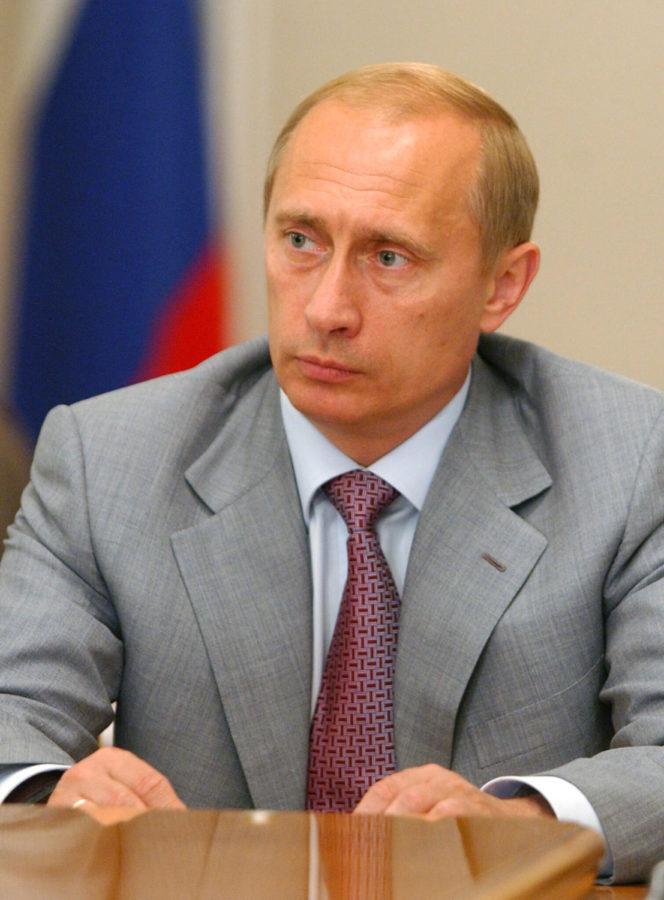Glawe: Tatars oppose Putin’s absorption agenda
Russian President Vladimir Putin’s mobilization leaves Russian civillians worried.
March 4, 2014
Within the span of a few weeks, the three-month long peaceful protests against the President of Ukraine Viktor Yanukovych has descended into political chaos and bloodshed. Fueling the anxieties of the Ukrainian people is the political instability of a now leaderless government, a looming economic crisis and a Russian intrusion upon their territorial integrity.
That last bit requires accentuation. Within the past few days, Russia has invaded Crimea, violating international law and Ukrainian sovereignty. Perhaps the late Gore Vidal was correct in asserting that the Cold War deposited upon history the idea of perpetual war because Russian tendencies towards military bullying clearly have not changed. That or Russians of the Vladimir Putin-sort long for the power they once possessed (or, at the very least, their dignity).
Unsubstantiated. That would best describe Russia’s justifications for intervention in Crimea, a peninsula of Ukraine. For instance, the Russian border guard agency has claimed that approximately 675,000 refugees have fled from Ukraine into Russia. However, many western journalists have called out the propaganda machines, such as Russia Today, for such false claims.
A mass exodus of this scale in just a couple of weeks would be noticeable.
Russia also claims “self-defense” in protecting their borders and the Russian-speaking people of Crimea.
The Crimean population is composed of 58% ethnic Russians, 24% ethnic Ukrainians and 12% Crimean Tatars. It would be accurate to say that the Crimean Tatars despise the Russian government. The Tatars endured great hardship under Soviet rule. Stalin’s regime once ordered a mass deportation of the Tatars, forcing them to abandon their homes in Crimea and live in exile. Indeed, many were fated to become slaves to the Gulag.
Now the Tatars, who have spent years reclaiming their homeland and cultural identity, must put up with the ingratiating “peacekeeper” remarks of the black-cowled Vladimir Putin. Who but a weakened Ukraine will stand by the Tatars and the remaining Ukrainians when the curtain is once again rolled over Crimea?
The lies about a humanitarian crisis not only display Putin’s hypocrisy on the issue of interventionism, but highlights the continued covertness of Russian action. Russia’s intentions are quite clear, just as they were in Georgia, Chechnya and Syria.
For example, in the midst of our discovery of chemical weapon use in Syria, Russia defended the Assad regime vociferously to protect their own interests in the region though granted they managed to begin confiscating the chemical weapons. Putin warned against foreign intervention, despite the fact that the Syrian conflict presented a very clear and unquestionable humanitarian crisis.
There is no humanitarian crisis in Ukraine, at least for the moment. Even if there was a crisis, opening up the borders to the refugees and expediting their emigration would suffice, as Turkey did for the Syrian people. If the conflict in Ukraine threatens the safety of Russian borders, then increase the security there, not in Crimea which lies beyond Russian jurisdiction.
Alas, Crimea is an asset to Russia just as the regions surrounding Georgia, such as Abkhazia, were assets. Russia wishes to annex Crimea. In order to do so they must take it by force from the Ukrainian government. They recognize the strategic advantage by striking now when the people are the most vulnerable.
Russia’s aggression should be characterized as a violation of Ukrainian sovereignty. Naming it an invasion is no exaggeration either. Exposed, again, are Russia’s slim gestures of peacekeeping and pseudo-cooperation with Western powers over the Iranian sanctions, the Syrian crisis, Georgia, the Baltic republics and now Ukraine.
As a representative of democracy, the United States should always make the effort to defend the revolutionaries who desire such an institution. Viktor Yanukovych was a corrupt and greedy leader. His actions were in direct contrast to the health of a democracy. He was worthy of an overthrow by the Ukrainians, by the people of the Maiden. It comes as no surprise that his primary supporter should be the Russian government – a dogmatic contrast to the solidarity of the people.
I vividly remember Westerners, indeed my fellow classmates, defending Vladimir Putin during the Syrian crisis and applauding him for preventing Western military intervention. Cheers sounded even when the clouds of sarin gas had yet to clear the air and the families of the innocent victims still grieved. One can only wonder what will happen to the Crimean Tatars or the remaining Ukrainians as they are absorbed into yet another enclave of the Russian clutch.
Where is that adulation now?







